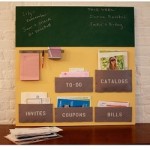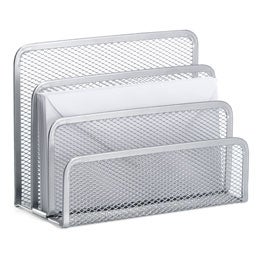The Organized Paper Trail
31 Jan
 Despite this digital world that we live in, papers (and what to do with them) remain a daily reality. Having a system, as well as an exit strategy, (i.e., when to recycle), is key if you want to lead an un-paper-cluttered life.
Despite this digital world that we live in, papers (and what to do with them) remain a daily reality. Having a system, as well as an exit strategy, (i.e., when to recycle), is key if you want to lead an un-paper-cluttered life.
What kind of system? Glad you asked…
Three Steps to an Uncluttered Life
Step 1: Control what comes in! Try as we might to minimize, paper is going to enter your home. The faster we can act on it, or get it into the hands of who needs to act on it, the less clutter we’ll create. Think of incoming mail like a game of hot potato!
Try a series of in-boxes to sort out important papers (bills, permission slips, etc.) from the less important ones (catalogs).  Â When you walk in the door, sort the mail immediately!
 When you walk in the door, sort the mail immediately!
Depending on your space and aesthetic, you might like something minimalor if the volume of papers coming into the house is too great, a series of baskets might be more what you need. If you have a larger household with kids old enough to receive and take care of their own mail, a magazine-rack style sorter might be in order.
Step 2: Sort, sort, sort. When you have time to sort through your inboxes, be decisive. RSVP to invitations, add dates to your calendar, schedule appointments… whatever it is, do it. The key is, take action!
Step 3: File, file, file. Once you’ve acted, the final step is moving things to their proper place. Important things that need to be saved, collect in a “to file” bin. Weekly (or more often, if your schedule allows), take everything out of your “Papers to File” and file them.Â
Personal correspondence can be tricky–I become attached to a pretty piece of stationary or a nice note from a friend. If you do, too, that’s fine…but create a system. I put mine on a bulletin board next to my desk for a few months, and when the board gets crowded I reevaluate. If I’m still feeling sentimental, it gets transferred to a folder called (unsurprisingly) “Sentimental Things.” I revisit this file every year or so and purge things as I see fit.
If you don’t have automatic bill pay set up (such a time saver!), check your Bills box Sundays, and pay the bills due that week. Write the due-date at the top of the bill so it’s easy to find the right ones quickly.
Helpful Hints
I use a rainbow of colorful accordion folders to house all my papers. If it’s worth keeping the papers, it’s worth keeping them organized and accessible. These come in a variety of sizes, to accommodate different subjects. Choose a 13-pocket folder for file types that need to be sorted month by month, and smaller ones for subjects that only need a pocket or two. Major topics, such as taxes (more on that next week), need their own folder.
I keep one folder for warranties, receipts, and instruction manuals (paper clipped together, of course) for all purchases with long-term or lifetime warranties. Another folder contains all of my health and health insurance related papers. Other categories (smaller, housed in the “Miscellaneous But Important” file) include “Car Stuff” (Title, registration copy, EZ Pass account info) and “Documents Not To Lose” (record of jury duty).
If you’re a homeowner, keeping a folder with documentation of any home improvement projects or repairs, along with the relevant invoices (which typically contain the contact information of the person who performed the service), is incredibly useful. Paint colors, tile brands, lighting fixture styles…you never know when something might break or need fixing. Knowing who to call and what to buy makes the process easier.
Insurance, Investments, Retirement…all important topics with ample paperwork that should have appropriately sized and labeled folders, depending on your needs.
At the end of the day….
- Mail and other incoming papers should be sorted when you walk in the door
- Read your mail, and then recycle promptly or file weekly
- Durable accordion folders are easy to work with
- Label the outside of each one so you can quickly remember what’s inside, as well as the tabs inside
- Revisit them annually (or more, if necessary) and purge as necessary
- Keep them in a safe and secure spot. The most important things, a metal cabinet is best, but file boxes or high shelves in an office work in a pinch.
If you have a different but effective way of storing your important papers, please share. Also, if you’ve gone digital, let tell us about the pros and cons


